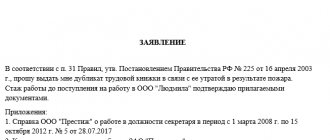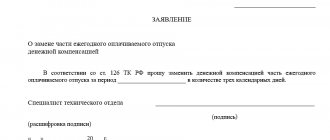From the article you will learn:
According to the norms of the Labor Code of the Russian Federation, an employee has the right to terminate his employment relationship with the employer at any time if he wishes. However, in practice, many employees are faced with the fact that the management of the organization where they work, for one reason or another, categorically refuses to let them go. When such situations arise, it should be remembered that the Constitution of the Russian Federation establishes the right of everyone to work and at the same time spells out a rule prohibiting forced labor. In this connection, if the boss (employer) does not sign the resignation letter, this goes against the law, and accordingly is fraught with serious sanctions. Let's take a closer look at how to get the final payment if the company's management prevents dismissal.
Rights and obligations
The main obligation of an employee who decides to terminate an employment contract is to notify the employer 2 weeks before the last working day of his desire to quit (Labor Code of the Russian Federation, Article 80). Termination of employment relations does not depend on the will of the company’s management. A citizen who has provided a written statement about this must be dismissed:
- issue settlement notes;
- issue the necessary documents and certificates;
- issue a properly executed work book.
If the parties agreed to terminate the employment relationship earlier, there is no need to wait two weeks. In some cases, the employer is obliged to dismiss the citizen within the period that he indicates in the application:
- violation of labor legislation, labor regulations, contractual obligations on the part of the company’s management;
- retirement;
- the need to learn;
- sending a spouse to a new duty station;
- other cases that objectively interfere with the performance of labor duties.
The legislation also has other deadlines for written notifications:
- for the manager – 1 month (Labor Code of the Russian Federation, Article 280);
- seasonal worker – 3 days (Labor Code of the Russian Federation, Article 296);
- working for an individual - the period is established by the employment contract (Labor Code of the Russian Federation, Article 307);
- for a citizen on probation – 3 days (Labor Code of the Russian Federation, Article 71).
For certain categories of employees, for example, athletes, etc., different notification periods for their upcoming dismissal may be established. They are prescribed in federal laws.
In the Labor Code of the Russian Federation, Art. 80 indicates the employee’s ability to withdraw his written notice (application) and continue to work if the maximum period before dismissal has not expired. At the same time, if the application contains a request for leave with subsequent dismissal, such a document can be recalled only at the beginning of the leave (Labor Code of the Russian Federation, Art. 127).
Attention! When calculating deadlines, calendar days are taken (Labor Code of the Russian Federation, Article 14).
So, the employee is not required to take permission from the administration to quit. But what to do if the manager does not accept the application, from the date of submission of which the period until the last day of work is counted?
Is it possible to quit without the employer's consent?
The current legislation does not stipulate that when resigning, an employee is required to receive a statement signed by the employer. If you are afraid of encountering obstacles from the employer, you can do the following:
- Draw up a letter of resignation in two copies;
- Submit both copies for registration to the secretary of the enterprise/company where you work;
- Leave one registered copy with the secretary, the second with yourself;
- Work the required 14-30 days;
- Afterwards, you can safely leave the place of work, having initially demanded that all the necessary documents and due payments be issued (balances of salary, bonuses, etc.);
In the next section we will describe the dismissal procedure in more detail.
Actions
When asking whether the manager’s signature on the application is necessary, it can be argued, according to the Labor Code of the Russian Federation, that for the employee who submitted the application for dismissal, its presence or absence on the document does not matter. An employee can terminate an employment contract without the consent of management.
A signature is required for personnel and accounting department employees to make relevant entries in the employee’s documents and calculate dismissal amounts.
If the manager does not accept the application for consideration personally, you can submit it in one of the following ways:
- Contact the office and register the application in accordance with the rules of office work. Need 2 copies. The secretary puts the date and assigned number on the employee’s document, puts his signature, and stamps “accepted.”
- If, by order of management or for other reasons, the secretary refuses to accept the application, it is sent by mail. The letter with the document is issued by registered mail, with a list of the attachments and with a notification of delivery. It is from the date when the letter is received by the manager (and not sent by the employee) that the countdown to dismissal begins.
- You can send an application online using your own digital signature. In accordance with Federal Law No. 63 dated April 6, 2011, an electronic application will have the same legal weight as a paper document. Note that judicial practice on the issue of “dismissal over the Internet” varies; the legislation does not directly prohibit or permit electronic document management of this kind. We can definitely say that sending an application without using an electronic signature, by regular email, is illegal.
After the expiration of the period established by law, usually two weeks, the citizen can stop working.
If, after the last working day, the payment has not been received, the dismissal documents have not been issued, the work book has not been handed over, i.e. the employee is not actually fired, they turn to the bodies that control labor legislation: the court, the labor inspectorate. The term for going to court is 3 months; the employee does not pay fees and court costs (Articles 392, 393 of the Labor Code of the Russian Federation). If the deadline for going to court has been missed, and the employee’s rights continue to be violated, you can contact the labor inspectorate with a statement. The powers of this body make it possible to check compliance with labor laws, bring the employer to administrative responsibility, demand that the violation be eliminated, and suspend the work of the company. The labor inspectorate can bring the company's management to court.
If the employer threatens
If an employer threatens to fire an employee for some violations (absenteeism, tardiness, etc.), then it is worth keeping in mind that the employer has the right to fire for one of these reasons no later than 90 days from the moment the violation was recorded..
Read about all the grounds for termination of employment here.
If the employer does this, then this decision can be challenged by filing a claim for unlawful actions of the employer in court. As a result, the employer will be forced not only to correct the entry in the employee’s work book about dismissal for a disciplinary violation, but also to pay material compensation for causing moral damage to his former employee.
Bypass sheet, transfer of cases, threat of articles and other difficulties
Dismissal at will can create certain difficulties for a manager. It is not surprising that sometimes they try to keep an employee at work for as long as possible in various ways:
- Sick leave and vacation. If an employee falls ill or takes leave during the period from filing an application to the date of dismissal, the requirement to “work” the missed days and then resign is illegal. These days are included in the calendar period without increasing it.
- Requirements to sign the bypass sheet. There is no concept of “bypass sheet” in the Labor Code of the Russian Federation. This document is used in the internal document flow of some companies and organizations as proof that economic, security, accounting and other services have no claims against the resigning employee. However, making dismissal conditional on signing this document is illegal.
- Requirements to transfer cases. The situation is similar to the previous one. This procedure is not prescribed by law and has nothing to do with the timing of dismissal under the Labor Code of the Russian Federation. It is completely voluntary.
- Article threats. An employer can dismiss for violation of labor discipline or incompetence only if absenteeism, reprimands, and other violations for which the penalty period has not expired have been recorded in the personal file. In particular, if an employee did not reach an agreement with the administration, after writing a statement, did not return to work 2 weeks later and was fired for absenteeism, this is a violation of the law. At the same time, even on the last working day, a quitter can receive production assignments in accordance with his position. If the employee does not have time to fulfill them, penalties may be applied to him, but he has no right to detain him at work. If in the two-week period before dismissal a citizen was negligent in his duties, he may be lawfully dismissed under Art. 81 of the Labor Code of the Russian Federation - for improper execution (clauses 5-10).
- If a student agreement has been concluded with an employee (Labor Code of the Russian Federation, Article 198) and the citizen decides to quit before its expiration date, the refusal to dismiss is unlawful. At the same time, if he studied at the expense of the company and, under the terms of the employment contract, had to work for a certain period of time (Labor Code of the Russian Federation, Article 57), the employer may demand compensation for expenses in money (Labor Code of the Russian Federation, Article 249).
Situations such as embezzlement of accountable amounts, shortages (Labor Code of the Russian Federation, Article 232) are not grounds for refusal of dismissal, but also do not exempt from financial liability. Material damage can be paid off from wages, but if the amount is higher than the average monthly salary, the issue will have to be resolved through the court (Labor Code of the Russian Federation, Article 248).
If the secretary refuses to accept the application
A situation is possible when the boss is so unwilling to agree to the dismissal of his employee that, anticipating his request to the secretary for registration, he prohibits the latter from accepting documents from a specific employee.
What should the employee do in this case? In this case, the following measures should be taken:
- Draw up a letter of resignation in two copies;
- Keep one with you, and send the second by mail to the address of your place of work;
The sent letter must necessarily have a notification function, because the countdown of two weeks of work will begin only after the employer is expected to familiarize itself with its contents.
- After receiving notification of receipt of the letter, begin working for two weeks, after which proceed according to the scheme written in the previous section;
Briefly
- An employee can resign at his own request at any time by submitting a written notice. The employer's consent is not required. As a general rule, the deadline for submitting it is 2 weeks before the end of the work. It starts running from the date of application.
- Sick leave, vacation, material expenses of the employee, internal administrative procedures preceding dismissal do not increase this period.
- After 2 weeks, the citizen may not go to work.
- In case of refusal of dismissal, non-payment of final settlement amounts, failure to issue documents and a work book, a citizen has the right to apply to the labor inspectorate or court to protect his rights.
Why might an employer refuse to sign a statement?
The grounds for refusing to sign a resignation letter may be:
- Reluctance to look for another employee , since the current employee is satisfied with the quality of performance of his work duties;
- An employee who wants to quit has accumulated too much work that needs to be completed as soon as possible. However, it will not be possible to complete the work within two weeks;
- It may take more than two weeks to find a new employee;
- Other personal motives of the employer;
Guided by one of the above reasons, the employer can use a variety of tricks in order to keep the employee at his previous place of work: he can threaten to fire the employee for some article that discredits his reputation, for example, for absenteeism, failure to comply with official duties, negligence, etc.
Read in the next section what an employee should do in such cases.
How not to quit?
We are all human, and relationships at work do not always work out the way we would like. And yet it’s worth leaving gracefully.
This subsection can be called comic. A sort of “bad advice” for those who are about to quit.
They don’t sign a resignation letter: what should an employee do? Be sure to tell the director what troubles await him. Threaten with all possible punishments: from judicial to heavenly.
There is another option: honestly tell the boss what the subordinate thinks about him. The more colorful the better. The director will be very happy and will want to send the employee “to free bread.” Look, he’ll sign the application.
You can walk through the team and explain to the boss what kind of bastards he manages. And fish, as you know, rots from the head. And in this story there will be a subtle hint that the leader himself is not the best. Since his team is so vile.
Defiantly refuse to perform your job duties. You can take it and go on sick leave in the midst of the reporting period. So what? People need to rest.
What is the penalty for coercion?
If, nevertheless, the employer’s guilt is proven, the law provides for the following administrative liability for him (under Article 5.27 of the Code of Administrative Offenses of the Russian Federation):
- fine 1000 – 5000 rubles;
- disqualification for up to 3 years;
- reinstatement of the unfairly dismissed;
- payment of money for forced downtime;
- compensation ordered by the court.
If a pregnant woman was forced to leave and this can be proven, the liability becomes criminal (Article 45 of the Criminal Code of the Russian Federation): according to it, the guilty manager faces compulsory labor, and his company faces suspension of activities.
Director's motives
The employer does not sign the resignation letter? What is his motivation for doing this?
First of all, an employee who decides to leave the company can be very valuable. Finding a replacement for him in two weeks is extremely difficult. So the director is stalling for time to find a worker. Some may say that this does not happen. It still happens. A command is given to post an advertisement about a vacancy. Although the previous employee has not yet been fired.
The second point is the spiritual impulses of the leader. I took in a green newcomer. He grew to be an excellent specialist. And I decided to move to another company. It's a shame for the current manager. But he's wrong. An employee’s desire to move to a company where he will grow professionally is quite natural. Another look at this situation and what needs to be done is well described in this article: https://fb.ru/article/377206/nachalnik-ne-podpisyivaet-zayavlenie-na-uvolnenie-chto-delat.








